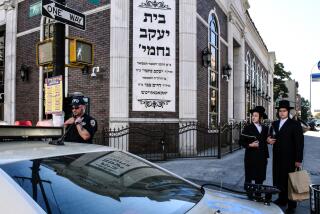Mutations, Breast Cancer Links
- Share via
WASHINGTON — Jewish women with the most common genetic mutations known to cause breast cancer have more than an 80% chance of developing the disease in their lifetimes, U.S. researchers reported Thursday.
And the risk is getting worse for the Ashkenazi Jewish women who were studied. Those with the mutations born before 1940 had a 24% chance of developing breast cancer by age 50, while those born after 1940 had a 67% chance.
“I was surprised at how, age by age, the risk is worse in more recent times,” said Dr. Mary-Claire King of the University of Washington, who led the study.
The BRCA genes in question, named for their role in breast cancer, help repair damaged DNA before it can make a cell turn cancerous.
In people whose genetic code differs in certain ways -- those with the mutations -- the repair process goes wrong.
Breast cancer will affect nearly 250,000 women and men in the United States a year, killing 40,000.
King said that in the Ashkenazi Jewish population as a whole about 2.5% of young adults carry one of the mutations and 10% of Jewish breast cancer patients have it.
Among U.S. white women, 7% of breast cancer patients carry mutations of BRCA1 or BRCA2.
But the study shows that staying slimmer and exercising moderately can delay the disease.
The researchers said breast cancer onset was “later among mutation carriers who were active in sports, dance or casual exercise as teenagers compared with those who were not physically active.”
They also found that slender women and those who had children tended to develop breast cancer later.
“As a group we are more sedentary and we weigh more [than in the past] but that is not the whole explanation and I don’t know what it is,” King, an expert in the genetics of breast cancer, added.
The study did not look at differences in diet.
Writing in the journal Science, King and colleagues in the New York area said they chose Jewish women for their study of 1,008 breast cancer patients because they are known to carry three well-defined BRCA mutations.
“The lifetime risk of breast cancer among female mutation carriers was 82%,” they found.
The study also showed that family history may not always be the best indicator of risk. Many of the patients had a limited family history of breast cancer, or none.
“Mutations in BRCA1 and BRCA2 are inherited from fathers as often as from mothers, although fathers are rarely affected with breast cancer. So if a family is small, there may be no warning that a mutation is present,” King said.
Currently, only women with a strong family history of breast or ovarian cancer are advised to be genetically tested for BRCA or other mutations.






